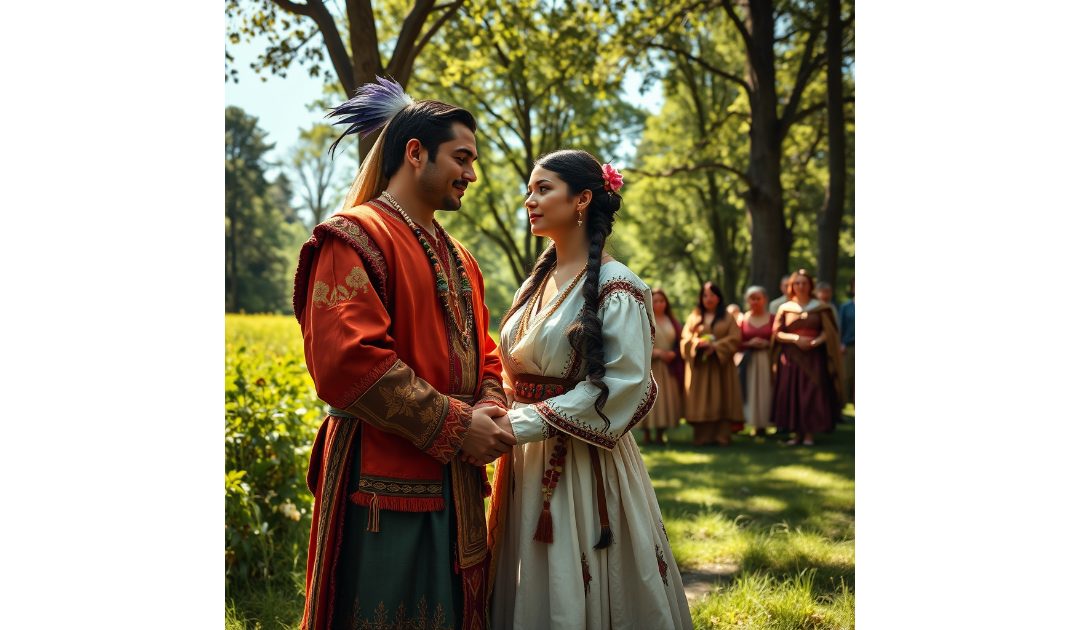On the 5th of April, 1614, the Native American, Pocahontas, married the English colonist, John Rolfe.
Pocahontas, a prominent Native American figure from history, lived during a time of great change and interaction between the indigenous peoples of America and the European settlers. Born around 1596, she belonged to the Powhatan tribe, a group of Algonquian-speaking Native Americans located in what is now Virginia. Her father, Wahunsenacawh, was the chief of the Powhatan Confederacy, a powerful network of Algonquian tribes.
Pocahontas’s real name was Amonute, and she also had a more private name, Matoaka. The name Pocahontas was a nickname meaning “playful one” or “mischievous.” Her early life was marked by the traditions of her people, learning the ways of her tribe, and experiencing the rich cultural heritage of the Powhatan Confederacy.
In 1607, when Pocahontas was around 11 or 12 years old, English settlers arrived in Jamestown, Virginia. This establishment of a permanent English settlement led to a complicated relationship between the Powhatan people and the newcomers. Tensions were high as the settlers struggled to survive, facing hunger, disease, and conflicts with the native tribes.
One of the most famous stories from this period involves Pocahontas and Captain John Smith, an English soldier and explorer. According to Smith’s account, he was captured by Powhatan warriors, and his life was saved by Pocahontas during a ritual execution. Smith’s account, however, is debated by historians, with some suggesting it may have been an exaggerated or symbolic tale.
Despite the ambiguities in Smith’s story, Pocahontas did become a key figure in the early years of the Jamestown settlement. She served as an intermediary between the colonists and her people, often bringing food to the starving settlers and helping to negotiate the release of Powhatan prisoners. Her interactions with the English were crucial in maintaining a fragile peace between the two groups.
In 1613, Pocahontas was captured by the English during a conflict with the Powhatan. She was taken to Jamestown, where she was held for ransom. During her captivity, she converted to Christianity and took the name Rebecca. It was during this time that she met John Rolfe, a tobacco planter. The two fell in love, and in 1614, Pocahontas married Rolfe, which was a significant event as it led to a period of peace, often referred to as the “Peace of Pocahontas,” between the English settlers and the Powhatan Confederacy.
Following her marriage, Pocahontas gave birth to a son named Thomas in 1615. The family lived in Virginia for a time before traveling to England in 1616. The Virginia Company, which had funded the Jamestown settlement, saw Pocahontas’s visit as an opportunity to promote their success and attract more investment. In England, she was presented as an example of a “civilized savage,” and she was received by English society, even meeting King James I.
During her time in England, Pocahontas experienced a vastly different culture. Her visit was short-lived, however, as she fell ill, possibly from pneumonia or tuberculosis. As she and her family were preparing to return to Virginia in 1617, Pocahontas became gravely ill and died at the age of 21. She was buried in Gravesend, England.
Pocahontas’s legacy has been subject to myth, romanticism, and historical revision. Over the centuries, she has been portrayed in various ways, from a romantic heroine bridging two worlds to a symbol of the cultural devastation wrought by European colonization. Her story has been retold in numerous books, films, and other media, often emphasizing themes of reconciliation and understanding between different cultures.
Today, Pocahontas is remembered as a figure of both historical significance and cultural mythology. Her life represents a poignant intersection of Native American and European histories, illustrating the complex dynamics of early American colonization. Her story continues to inspire discussions about cultural exchange, identity, and the impact of colonization. While much of her life is shrouded in legend, Pocahontas remains an enduring icon of American history and the profound changes that took place during her lifetime.

